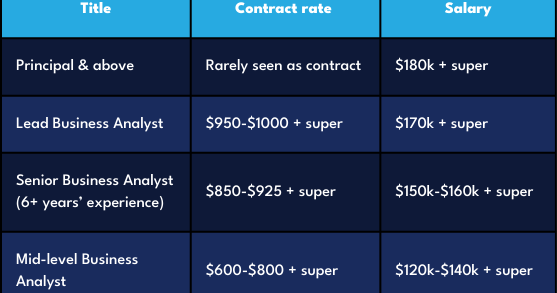Business Analyst Careers in Australia – Market Overview and Salaries 2024

The Business Analyst (BA) profession is incredibly vast, as every organisation requires these skills and expertise to ensure the efficient delivery of projects and business-as-usual processes. Presently across all industries, there are many exciting projects commencing as more businesses adapt to and capitalise on the post-Covid way of work.
Here’s an overview of Business Analyst careers, salaries, and the current hiring market.
In this guide:
- Business Analysis in a nutshell
- Technical skills and certifications for BA roles
- Career pathways for Business Analysts in Australia
- Market insights for BA roles
- Salaries and Rates
- Considering a career as a Business Analyst?
Business Analysis in a nutshell
In a nutshell, BAs work with the business to understand their current state and problems, and then collaborate with all stakeholders to design a plan that helps reach the desired target state. They serve as translators between the business teams (often from a range of backgrounds within an organisation, such as finance or HR) and the technical teams that allow their ideas to become a reality.
Therefore, stakeholder management is a large part of BA work (and sometimes the biggest challenge). But they’re also responsible for data analysis, project documentation, identifying different scenarios and options, cost benefit analysis, and coming up with the most effective solution to meet business needs. Make sure you learn the fundamentals to ensure it's the right career fit!
Generally speaking, business analysts need:
- a growth mindset - you're nimble and responsive to change
- An analytical mindset - you're a curious, collaborative problem solver
- Strong written and verbal communication skills
Technical skills and certifications for BA roles
Business analysts come from a variety of backgrounds, including (but not limited to):
- engineering
- software development
- economics
- commerce
- testing
- process improvement
- operations.
A business analyst role can fall into either a functional (business facing) or technical (technology facing) stream, which will determine what technology they must have exposure to.
Currently, most of the demand for BAs comes from banking. The common required technologies here, are:
- SQL
- Jira
- Confluence
- Holocentric
- Tableau
- SharePoint
Further, as many organisations are moving away from hybrid agile/waterfall project delivery towards full agile, BAs with agile experience are favourably considered.
Recommended certifications
There are several certifications that can help BAs stand out from the crowd.
A Chartered Financial Analyst (CFA) certification can be incredibly helpful for business analysts within some verticals. For professionals who are looking to move into a Project Manager role at some point in their career, they should consider a Prince 2 Certification.
You’ll want to explore:
- Certified Business Analysis Professional (CBAP)
- Prince 2 Foundation Certification
- Professional Scrum Master certifications (CSM)
- Chartered Financial Analyst (CFA)
There are several levels to being a fully certified Business Analyst Professional. It’s a worthwhile pursuit, though will take some time.
While certifications are beneficial, we’ve found that some of the best BAs are where they are in their careers due to their exposure to a range of projects across several organisations.
Career pathways for Business Analysts in Australia
BA career paths are endless, depending on where you want your career to go and what really satisfies you on a daily basis. Within banking? The world is your oyster. Once you’ve had exposure to the banking sector, you’ll encounter limitless opportunities to explore and advance.
While there are several streams within the profession, BAs with banking exposure could move into a pure agile stream, with promotion opportunities into Product Owners or Delivery Leads as one path.
Alternatively, if people management is a strength, running a BA practice is a good goal to aim for as it provides you with the standard hierarchical advancement opportunities (e.g., BA to Senior BA, to Lead BA to Principal BA to BA Practice Lead).
The best thing about BA roles is the variety of projects to be involved with, such as business critical regulatory projects, exciting and complex remediations, extensive transformations, data migrations and digitisations, to name a few.
The following roles could be considered:
- Project analyst or coordinator
- Technology specialist
- Software developer
- Operations, systems, sales or reporting analyst
- Customer support specialist
Market insights for BA roles
The business analyst market is still buoyant, but the job market is settling to pre-covid levels.
While there are a lot of candidates in the market, there are also a lot of industries needing business analysts!
Notably (and particularly within banking and finance), most Senior Business Analyst roles require several years’ experience within the Australian banking system or top tier world banks. This means candidates who have been Australian-based for some time will take the top spot on the shortlist.
There are of course, several exceptions to this observation, but for the most part, experience from the Big 4 Banks and other top-tier Australian banks, will put BAs in a good position for their next role.
Additionally, there’s a constant demand for business analysts with liquidity, market risk, credit risk, or financial markets experience.
Salaries and Rates

Considering a career as a business analyst?
Check out our detailed guide to getting a job as a business analyst.
If you’re an experienced BA exploring your opportunities, get in touch with AJ Walters in Sydney, Jodie Gray & Tobias Wilson in Brisbane, Conor Kemp in Melbourne or our Gov team!